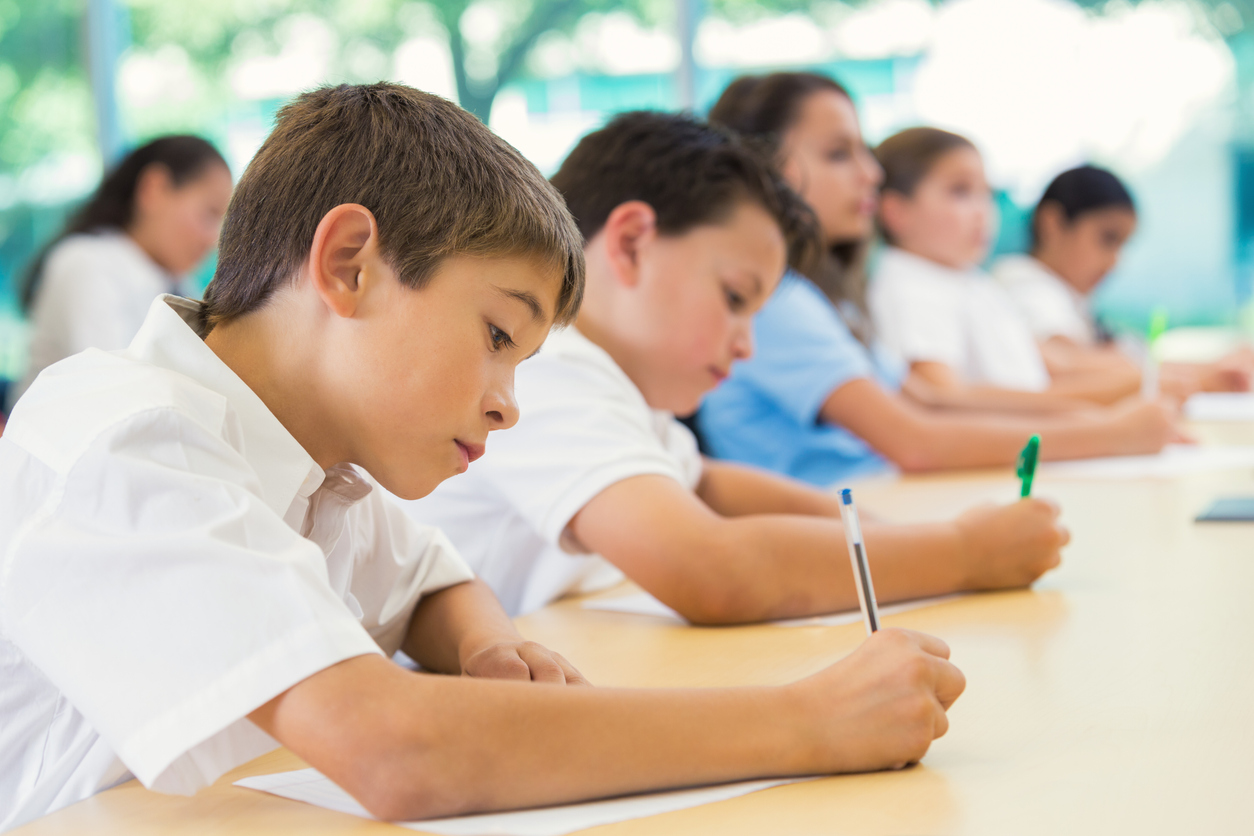- Home
- Video & Podcasts
- News
- WATCH: ‘Insulting’ funding change hits school catch-up
WATCH: ‘Insulting’ funding change hits school catch-up

The government’s change to the allocation of pupil premium funding for disadvantaged pupils - described by some as a “stealth cut” - has been widely criticised by teachers and school leaders.
And at one seaside school in the South West, the decision has left a budget hole that more than offsets any gains from cash aimed at helping pupils catch-up after the Covid-19 pandemic, its headteacher is warning.
Paul Gosling, who leads Exeter Road Community Primary School, in Exmouth, is the second head to speak to Tes as part of a mini-series about how schools are being affected by the controversial change to the way pupil premium money is being allocated.
This funding change, said Mr Gosling, has forced him to “readjust plans” for this year’s budget - with both academic and pastoral support for pupils stretched thinly to accommodate tightened purse strings.
“It’s just pinching again. It’s really, really insulting to those children and families, particularly as we’ve been told…before the pandemic, social mobility, social disadvantage was a real priority of the government,” he told Tes.
Watch: Will pupil premium ‘cut’ risk teacher jobs?
Nick Gibb: Schools ‘won’t lose out over pupil premium change’
Revealed: Primaries’ catch-up cash ‘wiped out’ by funding shift
Investigation: ‘Come clean’ on funding gap, DfE told
Exclusive: DfE’s valuation of ‘stealth cut’ kept secret
Background: Teachers ‘sickened’ as DfE delays cash for poor pupils
“And then we were told during the pandemic that education is a priority. And now, post-pandemic, they’re taking away a small amount of money for them, that has a massive impact on children.”
Pupil premium funding change ‘has a massive impact on disadvantaged children’
Mr Gosling, who is also vice-president of the NAHT school leaders’ union, was reflecting on his personal experience of the government funding change, described by Labour as a “stealth cut”.
The Department for Education has so far refused to specify the amount that schools are set to lose from its decision to calculate pupil premium allocations for 2021-22 based on a census from last October, and not in January, when more pupils would have been eligible for the money.
The estimated size of the resulting funding gap has ranged from £3.5 million across five London boroughs, to between £5.16 million and £7.26 million among schools in the North East. The national loss was placed at £133 million by Labour.
In order to better understand the impact of the change on the ground, Tes has been speaking to heads from across the country about the size of the hole it has left in their budgets - and what this means for the year to come.
In Mr Gosling’s case, it feels like a “kick in the teeth”.
At his school, seven pupils became newly eligible for the premium between October and January.
This means that, had the government allocated funds according to the January census, as schools had been expecting, he would have received an additional £9,415, which could have gone towards children in “desperate circumstances” sparked by the lockdown.
For example, it could have gone towards a part-time teaching assistant or pastoral support, he said.
That money that I’ve lost out on is greater than what I’ve been given in the catch-up funding.
“To hear that they’ve changed to the October figure, and we wouldn’t be getting that £9,000, I’ve had to readjust plans,” he said.
“And that money that I’ve lost out on is greater than what I’ve been given in the catch-up funding.”
Explainer: What is the pupil premium policy shift?
This year, the government has decided to calculate the number of children attracting pupil premium funding from April using a different reference point.
Instead of basing its allocations on the number of children eligible in January, as it has done in previous years, the Department for Education is using data from a census carried out last October.
The change means that any children who became newly eligible between October and January will not attract pupil premium money in school budgets allocated from April this year.
The policy shift came as a shock to schools, which said it would deprive them of thousands of pounds that should be spent on helping disadvantaged pupils.
Last June, the government pledged to share £650 million in catch-up cash between primary and secondary schools over the 2020-21 academic year.
Covid catch-up cash ‘cancelled out by pupil premium change’
Mr Gosling said his school received £8,887 from this funding pot.
But it has since become clear that the loss of pupil premium cash will hurt the very same children that the government said it wanted to help.
In Mr Gosling’s case, the value of his catch-up allocation for 2020-21 has been cancelled out by the £9,415 dent in his budget left by the policy shift.

The government announced a further ”one-off £302 million recovery premium” in February 2021. It said the average primary school would receive around £6,000 extra, to “further support pupils who need it most”.
But Mr Gosling said he had not yet been informed of his school’s final allocation from this second wave of funding.
How Covid is hitting disadvantaged pupils
He said: “We’re a seaside town school and unemployment has been hit by the lockdowns because a lot of the industry here is hotels and pubs, so those sorts of hospitality industries.
“So jobs have been lost, and families have been turning to the state for help, and we would use that money that we planned to get in April, from this year, to make sure the children have got all that they need to move them forward. Social mobility is a big problem anyway, and even more so in the South West. We don’t do particularly well for pupils in disadvantage.”
Asked about the tangible impact on children in his care, Mr Gosling said they would receive a smaller slice of post-pandemic support.

“It just means that children would have to share either the individual tutoring that I put in...and my counsellor. It means that I could have more of that and give children more time,” he said.
Time is money. Money is time. It just means all the children get a bit less counselling, a bit less tutoring.
“All I’m going to have to do now is divide up the time that these people spend with children, rather than have enough money to pay for that time. Time is money. Money is time. It just means all the children get a bit less counselling, a bit less tutoring.
“Will it be enough? I don’t know. I think we need more for lots of children - there are children not eligible for pupil premium that also benefited from the resources that schools have. It was never ringfenced, it was to help everybody, but particularly as long as you can impact those children with disadvantage.”
Mr Gosling said he was now “waiting for the next round of catch-up funding to be announced”.
“I’ll be relying on that to backfill the work that the school [does],” he said.
“I mean, Devon is...in the lowest 40 funded authorities - we’re always balancing the books and trying to find cost savings, so this just means I have to take money from elsewhere to cover what we do anyway.”
What will Ofsted think?
He also raised questions about how the change will impact on Ofsted’s expectations in the coming year.

“Remember, schools have to produce a pupil premium strategy and will be accountable for Ofsted,” he said.
“So do I say, if Ofsted turn up, that those seven children whose parents were eligible for benefits between October and January, I shouldn’t spend anything on them? Do I say, ‘I’m not to be held accountable for them because you haven’t given me the funding for them?’”
‘Don’t insult heads’ intelligence on pupil premium’
Asked how he responded to schools minister Nick Gibb’s recent suggestion that schools claiming they are losing out from the change may not have calculated the impact correctly, Mr Gosling said candidly: “Nick Gibb, don’t tell me how to construct a budget.
“I’ve been doing it for many, many years, and I know all the factors and what to look at and I know what an increase and decrease looks like, so don’t insult our intelligence.”
The schools minister said last month: ”[Schools] will not have done the matching process of ensuring that the new eligibility for free school meals - if they’ve ever been eligible for free school meals in the last six years, they will already be receiving pupil premium funding for that school.”
A DfE spokesperson said: “Pupil premium funding is expected to increase to more than £2.5 billion next year, and per-pupil rates are unchanged - so a typical school will see an increase in its pupil premium allocations this year compared to last. Any pupil who becomes eligible after the October census will attract funding in the following year.

“On top of this, we have provided a £14 billion increase in school funding over three years - the biggest uplift in a decade - and school leaders can target our ambitious recovery funding, worth £1.7 billion, towards supporting disadvantaged pupils.”
You need a Tes subscription to read this article
Subscribe now to read this article and get other subscriber-only content:
- Unlimited access to all Tes magazine content
- Exclusive subscriber-only stories
- Award-winning email newsletters
Already a subscriber? Log in
You need a subscription to read this article
Subscribe now to read this article and get other subscriber-only content, including:
- Unlimited access to all Tes magazine content
- Exclusive subscriber-only stories
- Award-winning email newsletters



